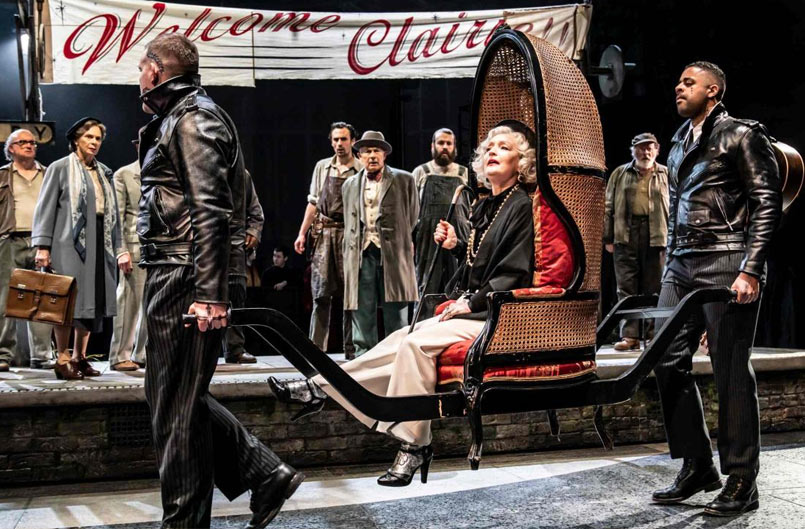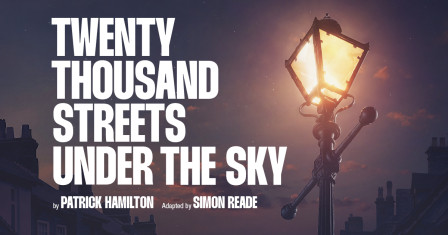Review: THE VISIT at the National Theatre
It has been nearly 30 years since Friedrich Durrenmatt’s THE VISIT visited London. It was at the National Theatre then and now, in a new adaptation by Tony Kushner, it is re-visiting The National Theatre. This long delayed visit was anticipated with great interest and now that it is here, it is also very long.
 The cast of The Visit at the National Theatre. Photo by Johan Persson.
The cast of The Visit at the National Theatre. Photo by Johan Persson.
Durrenmatt’s 1956 black comedy morality play is about a rich widow, Claire Zachanassian, returning to her hometown to take revenge on the people of that town who ostracised and banished her for being unmarried and pregnant at the age of 16. The ultimate revenge is reserved for her childhood boyfriend Alfred Ill, who impregnated and abandoned her.
When she became the richest woman in the World, she successfully set about destroying her hometown by buying up all the major institutions and businesses and bankrupting them with neglect. On her return, she pledges to donate to the town and the people one billion (local currency), half of which will go to revitalise the town with the other half to be shared equally amongst the townspeople.
Her condition for the donation is dependent on Alfred Ill being killed by one of the townspeople. The townspeople immediately respond and reject her offer. Initially pleased with themselves for taking the moral high ground, they soon succumb to the corrosive allure of greed and consumerism.
Tony Kushner, best known for his epic 8 hours play ANGELS IN AMERICA adapted Durrenmatt’s original German/Swiss play. True to form, his adaptation is an epic of almost 4 hours. Kushner has expanded on the Durrenmatt’s original play (normally under 2 hours long) with his commentary on the moral and social decay of the United States in the Depression era. He has transformed a black comedy morality play into a plodding, wordy play about the decay of American society and commerce, set in Slurry, an industrial town outside New York.
Important social and moral questions poised by Durrenmatt’s original play relating to the corrupting power of money are side-lined by this adaptation. It also reduces Durrenmatt’s calculating Claire into someone merely out for revenge.
The much lauded, Lesley Manville who has proven her intense and dramatic prowess as an actress in her Awards winning performances in GHOST and the TV sitcom MUM is surprisingly unconvincing as Claire. Her characterisation of a vengeful scorned woman is ill defined. She delivered her lines efficiently but never convincingly. Perhaps Jeremy Herrin, the director, imposed realism on to what should be a fantasy, outlandish character. Hugo Weaving is also unconvincing as her ex-lover, Alfred Ill. He seems to be grappling with his American accent most of the time. Sara Kestelman as the Principal Henrietta Covington makes an impression, and is especially effective in her Act Three speech.
In an attempt to present this long adaptation as an epic production, the vast revolving stage of the Olivier Theatre is employed but to very little effect. The set is neither epic nor spectacular, it is in turn, clunky and sparse. A black comedy with moral and social questions and ramifications is really more effective in an intimate production. The blues and jazzy music by Paul Englishby is likewise, not very effective, only occasionally reminding us of the setting of Slurry.
All in all this lumbering revival tries the audience’s patience whilst offering little in return.
Latest News

 Review: UKRAINE UNBROKEN at Arcola Theatre
3 March 2026 at 16:18
Review: UKRAINE UNBROKEN at Arcola Theatre
3 March 2026 at 16:18

 New Cast Announced For MAGIC MIKE LIVE
3 March 2026 at 15:09
New Cast Announced For MAGIC MIKE LIVE
3 March 2026 at 15:09

 World premiere of 'BLOODSPORT: AFTER HELEN OF TROY' at Stratford East announced
3 March 2026 at 12:00
World premiere of 'BLOODSPORT: AFTER HELEN OF TROY' at Stratford East announced
3 March 2026 at 12:00

 Troupe Announces World Premiere of TWENTY THOUSAND STREETS UNDER THE SKY
3 March 2026 at 11:28
Troupe Announces World Premiere of TWENTY THOUSAND STREETS UNDER THE SKY
3 March 2026 at 11:28
